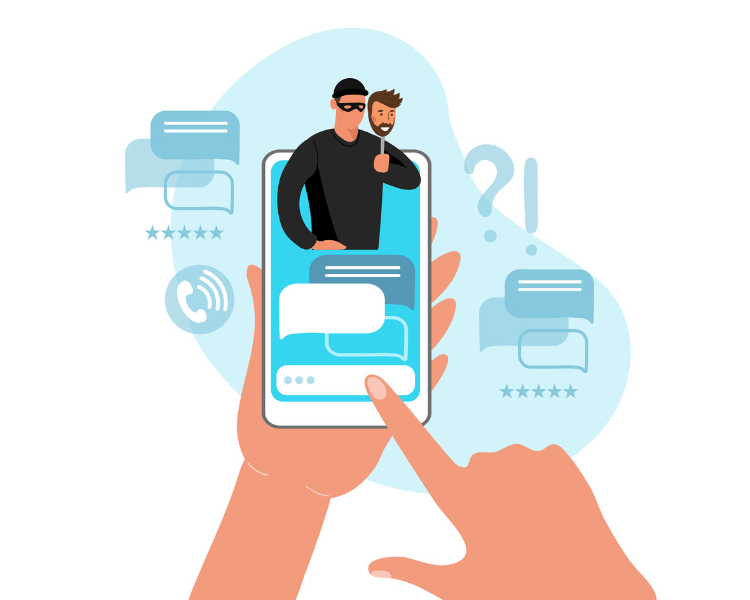
What is Sextortion?
How does it happen and go from a Romantic Relationship to Blackmail?
Don’t Panic – You Have Options!
Here is a guide to help you better understand the crime and what to do about it.
Be sure to read all of our guides about sextortion!
Sextortion Is A Serious Crime!
Sexual extortion or ‘sextortion’ is a form of blackmail where someone threatens to share a nude or sexual image or video of you unless you give in to their demands. If this happens to you, you’re not alone – there’s help available.
This may be difficult if you are already in a sextortion scam and are being blackmailed, but you can survive this.
Sextortion is a form of online crime where someone threatens to distribute intimate images or videos of another person unless they comply with demands, usually monetary or sexual in nature.
Typically, the criminal obtains these materials through coercion, manipulation, or deceit, such as posing as a romantic interest or befriending the victim online. Once they have the compromising material, they use it as leverage to extort from the victim, demanding money, more explicit images, or other favors under the threat of exposing the material to friends, family, or the public.
Sextortion can have severe emotional and psychological effects on its victims, leading to feelings of fear, shame, and powerlessness. It is a serious cybercrime that preys on individuals’ vulnerabilities and trust, and it is important for everyone to be aware of the signs and take steps to protect themselves online.
If you have already experienced this there are steps you can take. You are not powerless!
Need To Talk?
Call NOW!
988
Phone Help in the U.S. & Canada
Sextortion Basics – What You Need To Know Now!
Remember, it’s not your fault, even if you shared the intimate content with the blackmailer in the first place – anyone can experience sextortion. It is not personal for them, it is just business.
Blackmailers usually give up when they realize you won’t pay. But if they do share your intimate image or video online, you can report it to your local police or national cybercrime police (such as the FBI) and they can help get it removed.
What are the Warning Signs?
Blackmailers often target people through online dating sites, social media, and gaming apps.
They pretend to be an attractive person looking for a relationship, or sometimes sex, then trick you into sending nudes or sexual images or videos, or recording you during a live chat with them.
Once they have an intimate image or video of you, they threaten to share it with your family, friends, or co-workers unless you give them what they want.
These are things to look out for:
- Something does not add up. Their online profile doesn’t match what you see and hear when you talk or chat with them.
- It happens too fast. They express strong emotions for you almost straight away, and quickly tempt you across to a more private channel, suggesting you get nude or sexual in a video call.
- They make excuses. They say their webcam is not working and instead, they send a nude photo which they claim is of them.
- They pile on the pressure. They keep asking you to be sexual and to send nudes with your face in the shot.
Remember, it’s always OK to say no to sending nudes or getting sexual online.
How you can be Blackmailed
Here are some examples of how you might be blackmailed.
Someone Hooks You with a Fake Profile or ‘Catfishes’ You
This is when they pretend to be someone they’re not so that they can scam you. It can happen really quickly – often they send a direct message with a ‘sexy pic’ they claim is of them. (But how would you really know? Have you ever seen them live on camera or face to face?) Then they ask you to send a naked selfie or record you getting sexual online.
Next thing, they threaten to share the image or video with your family, friends or co-workers if you don’t pay them. Usually, they ask you to transfer money or send them cryptocurrency, gift cards, or online game credits.
Someone Claims to have Hacked Your Device or Account
They falsely claim they have ‘found’ intimate images or videos of you saved on your device or in your account. This person might even use one of your current or former passwords to make you believe it’s true, but you can never be sure if they really do have access.
Then they threaten to share the image or video they claim to have found unless you pay up.
Someone ‘Grooms’ You
This is when a sexual predator tricks you into thinking you’re in a close relationship, so you feel OK about sending nudes or getting sexual online.
They then say they will make the images or videos public, or hurt you or someone you care about unless you send more nudes or get sexual with them on camera. Grooming usually refers to an older person forming a relationship with someone under 18, and a predator who does this is often called a ‘pedophile.’
Any sexual activity between a child and an adult is child sexual abuse. Sexual activity may be sexual intercourse, sexual touching, or sexual acts that happen in person or online. It may involve coercion, force, or implied force. Online child sexual abuse is any form of sexual abuse of a child under 18 that has a link to the online environment.
Remember This
Romance or relationship scams (Catfishing,) scamming, grooming, or blackmailing someone is a crime. Don’t believe the blackmailer if they say they will delete the intimate image or video. If you give them what they want they will just keep asking for more.
What should I do if I’m Being Blackmailed?
Don’t pay the blackmailer or give them more money or intimate content. If you have already paid them by money transfer or gift car, you may be able to cancel it.
Before you do anything else, reach out for support. Being blackmailed over your intimate images or videos can be stressful and upsetting – in fact traumatizing. You don’t have to cope on your own. It’s a good idea to tell a friend, family member, co-worker, or someone else you trust, so they can help you deal with the situation. Or you can contact a confidential counseling and support service.
Then follow these steps…
1. Collect evidence
Save a record of:
-
- all contact with the blackmailer, particularly their demands and threats
- how they contacted you – for example, the Facebook URL (web address) where the blackmailer sent you a threat or their usernames on Snapchat, Instagram and any other online platforms
- when they contacted you, including dates and times
- details about the blackmailer – for example, their bank account or phone number
- any reports you have made about the issue to any online platforms or to the police.
Take screenshots or screen recordings, or photos of your screen with another device, it is a quick and easy way to collect evidence. Include the threatening messages and the blackmailer’s profile. Don’t send your images or videos to any other services.
Find out how to take screenshots on a Mac, Windows PC, Apple devices or Android devices – do a search on Google for the latest information for your devices.
2. Report sexual extortion
-
- If you’re under 18, the best way to get help is to report it to your local police.
- If you’re 18 years or older, report it to any platforms or services where the blackmailer contacted you. If your intimate image or video is shared, also report it to your local police.
3. Stop further contact, tighten security, and prevent sharing
-
- After you have collected evidence, use in-app functions or your device settings to block the blackmailer and ask your friends to do the same.
- You can also temporarily deactivate your accounts to prevent the blackmailer from harassing you (but don’t delete the accounts, as you may lose evidence that way).
- Review the privacy and security settings of your accounts to limit who can contact you. If you’ve been scammed, change the passwords for your social media and other online accounts. For more information about how to adjust settings on different apps, games, websites, and online platforms and services.
What if I’ve Already Paid the Blackmailer?
If you transferred money from a bank account, contact your bank to see if they can help.
If you have paid by a money transfer, you may be able to cancel it if you act quickly.
Sextortion Menu
- Sextortion Basics
- For Teen Guys – Sextortion Scams – What Are They? How To Survive Them?
- For Teen Girls – Sextortion Scams – What Are They? How To Survive Them?
- Surviving Sextortion / Sexual Photo Blackmail
- When Sextortion Goes Wrong – When Scammers Post Those Photos
- Helping Someone Survive Sextortion/Blackmail
- Sextortion Support Resources Worldwide
- Getting Photos & Video Removed Using Copyright
Takedown Services
- If you’re under 18, you can use takeitdown.ncmec.org – a free online tool that prevents your image or video from being shared on platforms such as Facebook, Instagram, TikTok, Yubo, OnlyFans, and Pornhub.
- If you’re 18 or older, you can use StopNCII.org – a free online tool that prevents your image or video from being shared on platforms such as Facebook, Instagram, TikTok, Bumble, OnlyFans, and Reddit.
More Sextortion Resources
- USA – Sextortion: What Kids and Caregivers Need to Know — FBI
- USA – Financially Motivated Sextortion — FBI
- AUSTRALIA – Dealing with sexual extortion | Australia eSafety Commissioner
- CANADA – Cybertip.ca
- Thorn – Stop Sextortion – Get Help
- Get Help Now – Cyber Civil Rights Initiative
- USA – National Center For Missing & Exploited Children
- Take It Down Tool
• Tool: takeitdown.ncmec.org
• PSA: youtube.com/watch?v=pAaXbBzVdJE - What to do:
• missingkids.org/theissues/sextortion - Request Victim/Family Support
• email: gethelp@ncmec.org - Report to the CyberTipline and Survivor Services will reach out with additional resources: cybertipline.org
- Take It Down Tool
- USA/CANADA – National Crisis Hotline
- Call 988 or Text 4HOPE to 741741
- https://www.crisistextline.org/ for access to a trained counselor
- AUSTRALIA – 24/7 helplines – free and confidential:
- If you’re 25 or younger, you can call or chat online with Kids HelplineExternal link (1800 55 1800).
- If you’re 18 or older, you can call, text or chat with LifelineExternal link (13 11 14).
- USA – FBI “How Can We Help You”: https://www.fbi.gov/how-we-can-helpyou/safety-resources/scams-andsafety/common-scams-and-crimes/sextortion
- ICAC Task Force Contacts: https://icactaskforce.org/TaskForceContacts








